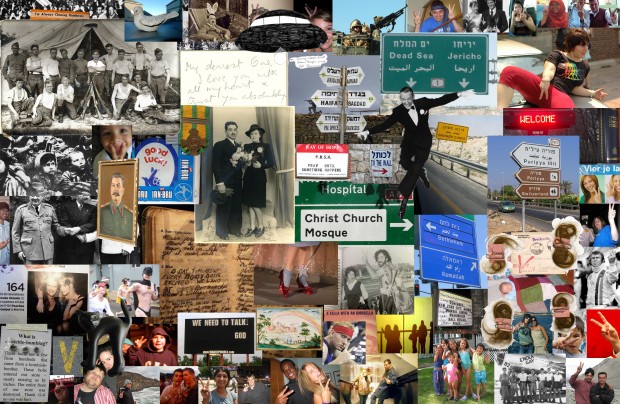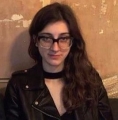You have no items in your cart. Want to get some nice things?
Go shopping
Maybe it’s because the hanging is a month old and secured only by ball head pins, but the outsized prints of Joanna Piotrowska’s FROWST are curling at the edges like bedroom posters or snapshots tacked and forgotten on corkboard. They’re family photos made static and huge on a current of anxiety, fretting tableaux of overridden bodies and strained poses, and they’re already in meltdown. Someone in a velour tracksuit droops over an (almost) naked man in a lawn chair, headless except for the jut of a jaw, and two men recline in underwear on a rug: we’re intruding on an intimacy, or at least a physical proximity, if an unheimlich one. Piotrowska photographed family members, but the relationships are uneasily ambiguous, the tightness of the poses worrisome. A woman holds a grown man under the arms like a baby, but the possibility they aren’t mother and son nags. Even more disquieting is the private pose of VII, as a woman stiffly straddles a man crammed between tables and we stare over her shoulder. The prints are large, to linger on and knock us with the buzzing tensions in these poses, the strain of being so close.
It’s the tension and charge in these bonds that Jerwood Space is inspecting—exploding—in Family Politics. In its interrogation of the institution of family, the exhibition – which is presented in conjunction with, and borrows its motif from, Photoworks’ new Annual publication – serves as an incendiary foretaste of the upcoming Family issue of Litro. Here are the plastered smiles of family albums, suspended and stretched in Robert Crosse’s video snaphots, and in Claudia Sola’s Being There, the spatter of weddings and faiths and tumours and scars behind them. Family Politics is an assembly of someone’s family photographs—personal, found, constructed, scraped off Google searches, and sent in the post—and they’re both peculiar, Tolstoyan, in their unhappinesses and very much the same. They share a claustrophobia (of having the same blood and nose and picture frame), a destructive and regenerative logic that links birthdays and biopsies, and a lot unspoken behind the “cheese”.
Robert Crosse’s family holds those portrait smiles for mouth-straining minutes in Family Values, frozen-over birthday parties, restaurant dinners, and in the car. Each breaks character at intervals to eat or blow a noisemaker, while the others remain fixed on the lens. The effect is a series of eerie tableaux vivants, each decaying as the grins grow more strained, and a commentary on emotional distance and the staging of family joys for outsiders and albums. There’s an itching magnetism to these photos, Freud’s uncanniness, Unheimlichkeit, as the familiar, the familial, is estranged and the repressed revealed. Although the subjects of these family shots are strangers to us, there’s a commonality in the scenes, the dinners and Christmases and mundanities, that jars, particularly when those scenes are deformed.
Jonny Briggs’s Close to Home series mutates his own family memorabilia, duplicating faces across old snapshots to remould his family memories. Briggs was raised by women, his mother and his four sisters, and had a difficult relationship with his father: these edited photos erase the male entirely and reimagine the feminine childhood Briggs remembers, with himself as daughter sharing his mother’s face or another kid in the matriarchal tribe with grandma’s face. Twice pink thread intrudes, bunched over a dinner table and knit through the orifices of a child’s face and dangling down. It’s a female lineage, in food and a child’s features, but it’s not as facile as that. It’s bit of perverse scrapbooking, a messy union of supposedly “female” family arts—the sewing and the collecting of photos, keeping of memories—and also a tether to Briggs’s Tapestry series across the room. There, he sets family members adrift in the static of an ugly pink and brown pattern, each tapestry like a scrap ripped from a couch. The last one unravels the figures entirely, and the threads that stitched family spill out uselessly from the bottom.
Nikolai Ishchuk’s Offset also raided and spliced a family archive, but these grinning couples and friends are doubly alien, pulled from a photo album he stumbled upon Moscow. The series’ title refers to the offset function on Photoshop, which automatically bisects images and reverses their halves. Here it produces photographs with vacant, sagging centers, cleaving couples and limbs and flinging them to the edges of the frame. The numeric titles refer to the number of pixels now between them, across the warped landscapes and wallpaper. The companion pieces further assert that cavity: they’re collages in negative and they seemingly replicate the silhouettes in the photographs, not the least because they’re standard snapshot size.
Sola’s Being There video installation strips the intimacy from family shots still further, arranging them in a strobing grid with ranks of others, using them to encode motifs and make witty segues and unsettling patterns and discords (stamp collections to Nazi paraphernalia, for example). What began with a full projection of Sola’s grandparents on their wedding day, materializing slowly from static, devolves into a surge of photo sequences as beloved wedding photographs, souvenirs shots and holiday memorabilia are abstracted to flickering patterns. The weird, grotesque, and horrible surface faster and faster — in crackpot collections and snapshots of war — until the screen is a flickering mass of gore, surgical staples, tumours and scars, and a stunning exposure of the fragility of that collectivized life we’ve been watching. The music speeds and smears and microscopic images of diseases Sola’s friends and family have suffered metastasise across the screen with children’s drawings, medical diagrams, and tattoos. It’s a white-knuckled seven minutes, almost unbearable at times, but it ends on an affirmation. The final frame – full projection like only the first – is a bicep inked with “Mum and Dad”: an assertion of the permanence of these family ties, through rifts and offsets and estrangements and participation in endlessly smiling video art projects, and everything microscopic and brutal that can kill.
Jerwood Encounters: Family Politics is now closed, but the first Photoworks Annual, based on the theme Family Politics, is available for £20. Meanwhile, at the Jerwood Space, a new exhibition, Jerwood Open Forest, opens on January 15 and explores the relationship between art and the environment.





